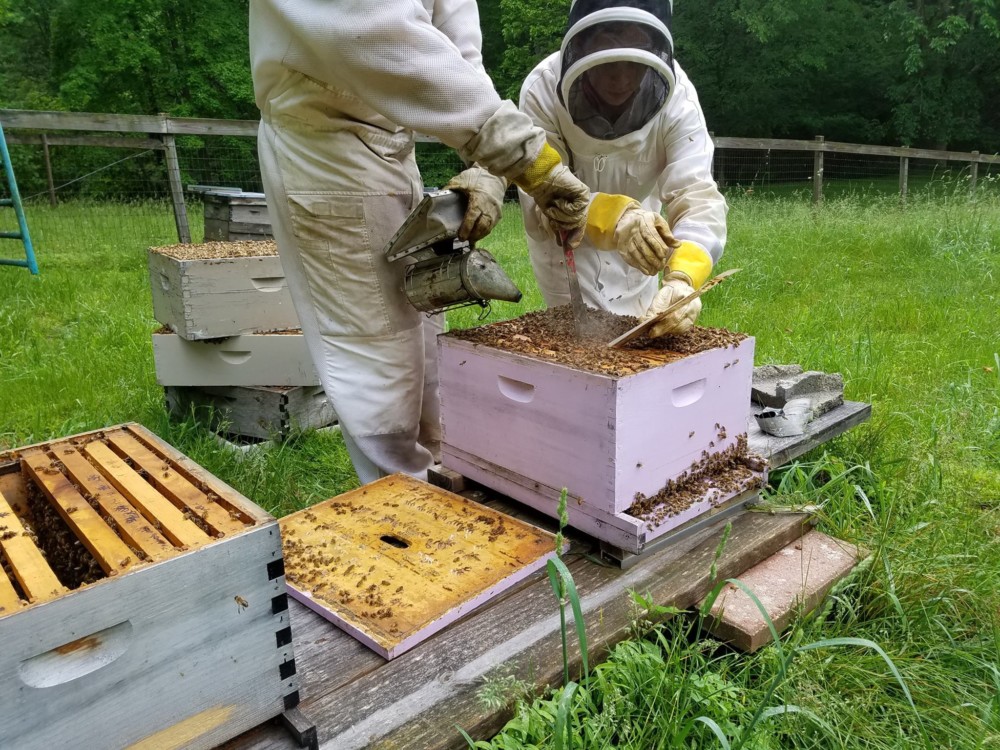By Kurt Christian
The Herald-Times
WWR Article Summary (tl;dr) The “Bee Corp” creates infrared imaging software for commercial growers who rent beehives for pollination.
Bloomington, Ind.
The Bee Corp’s Friday morning announcement that it will move to Indianapolis makes it the first startup company to graduate from Bloomington’s cowork and business incubator space.
Along the way, CEO Ellie Symes and CMO Wyatt Wells earned in the range of $500,000 in prize money and grants to support the company’s evolution from a data management software startup combating bee colony collapse disorder to an internationally known business creating infrared imaging software for commercial growers who rent beehives for pollination.
For their success, the startup’s founders became the darlings of their alma mater and The Mill, a local institution dedicated to fostering the growth of smaller companies.
Now, The Bee Corp is shipping up to Indianapolis because Bloomington doesn’t have the employees the company needs to continue its growth.
“As an innovative technology software startup, there’s not the group of talented individuals we’d want to hire,” Wells said. “I think a lot of companies in Bloomington have similar issues of encouraging people to come to Bloomington to work.”
Much about the business has changed since it grew out of Symes’ vision for managing beehives. After establishing Indiana University’s first student-run colonies, Symes framed her interest in beekeeping as a business consulting proposal through IU’s Kelley School of Business.
The pitch captured Wyatt Wells’ attention, and the two have since learned a lot. Wells said almost half of the industry’s revenue comes from beekeepers traveling to the West Coast to pollinate California almond trees.
Wells said he and Symes considered moving to California or Colorado, but eventually decided to move to Indianapolis for the continued support they’ve gotten from the Indiana Economic Development Corp. and Agrinovus Indiana, a nonprofit promoting the growth of the state’s agbioscience sector.
“We’d be losing a lot to break all of these relationships and move out to the coast,” Wells said. “This is not an easy decision, but we feel like going to Indianapolis instead of the West Coast is kind of like splitting the difference. We’re also thinking of the future. We want to stick around the Midwest, around these industries that could benefit from the infrared and the technologies we’re building.”
Since the start of The Bee Corp, Wells said, the company has always been passionate about food security. He said staying in the Midwest will allow the company to branch out into other agbioscience endeavors in the near future. The question then becomes, why not Bloomington?
The Bee Corp wasn’t without local supports in south-central Indiana. The Bloomington Economic Development Corp., Indiana University, the city’s Department of Economic & Sustainable Development, events like Combine and Crossroads pitch competition and a slew of local entrepreneurs have provided financial and advisory supports.
Pat East wears three hats when he talks about The Bee Corp. He’s executive director of The Mill, a member of Bee Corp’s advisory board and an investor in the company — twice over.
“It’s kind of a bittersweet moment. You want companies to do well, you want them to grow,” East said. “The bitter part is you want them to stay. On the flip side, if they need to go somewhere to find talent or customers, that’s what they need to do for the health of the company.”
Wells said, while the city council can’t accommodate a young company at every turn, the prolonged debate over downtown parking facilities is an example how Bloomington’s environment moves at a slower pace than companies like The Bee Corp.
He said startups have to make heavy decisions quickly, without all the necessary information. He said, sometimes, it can seem like Bloomington has an identity crisis that contributes to talent leaving — or never showing up.
“It’s not sure if it’s a city that wants to be unique for IU, or a city making its own name outside of IU,” he said. “We want our legacy to show students that aspiring entrepreneurs can stay here and do what we did, and they don’t have to feel bad for taking that next step that makes the most business sense for them.”
East said Bloomington is good at helping startups; there are low infrastructure costs and a stream of interns willing to work for less. He said the problem is there’s not enough messaging that goes beyond saying “start here” to encourage companies to “stay here.”
“It’s a little bit of a cycle that we need to be aware of,” East said. “If we’re marketing ourselves as only a great place to start a startup, we’re doing a disservice to ourselves and incentivizing people to leave.”
East called it manufactured serendipity — working with the right people, doing the right things, putting in the work and letting successful companies graduate and venture off into the world.
“We just need to keep doing enough of these good things and over time, it will come back to us,” East said. “I hope all of that pans out and plays out like that, but ultimately, I don’t know if it will. None of us do. We’re just kind of stacking the deck in our favor.”
The Bee Corp has yet to identify office space in Indianapolis, but at the same time, it’s continuing to grow its work force.
Software Developer Jordan Gaeta joined the company earlier this year to work on the mobile aspects of their product. Wells said he knows the company wouldn’t be where it is today if not for those supports it received in Bloomington.
“We’ll never claim to be founded in Indianapolis,” he said. “We’re proud of our Bloomington roots. We want to be a success story out of Bloomington.”














































































































































































































































































































































































